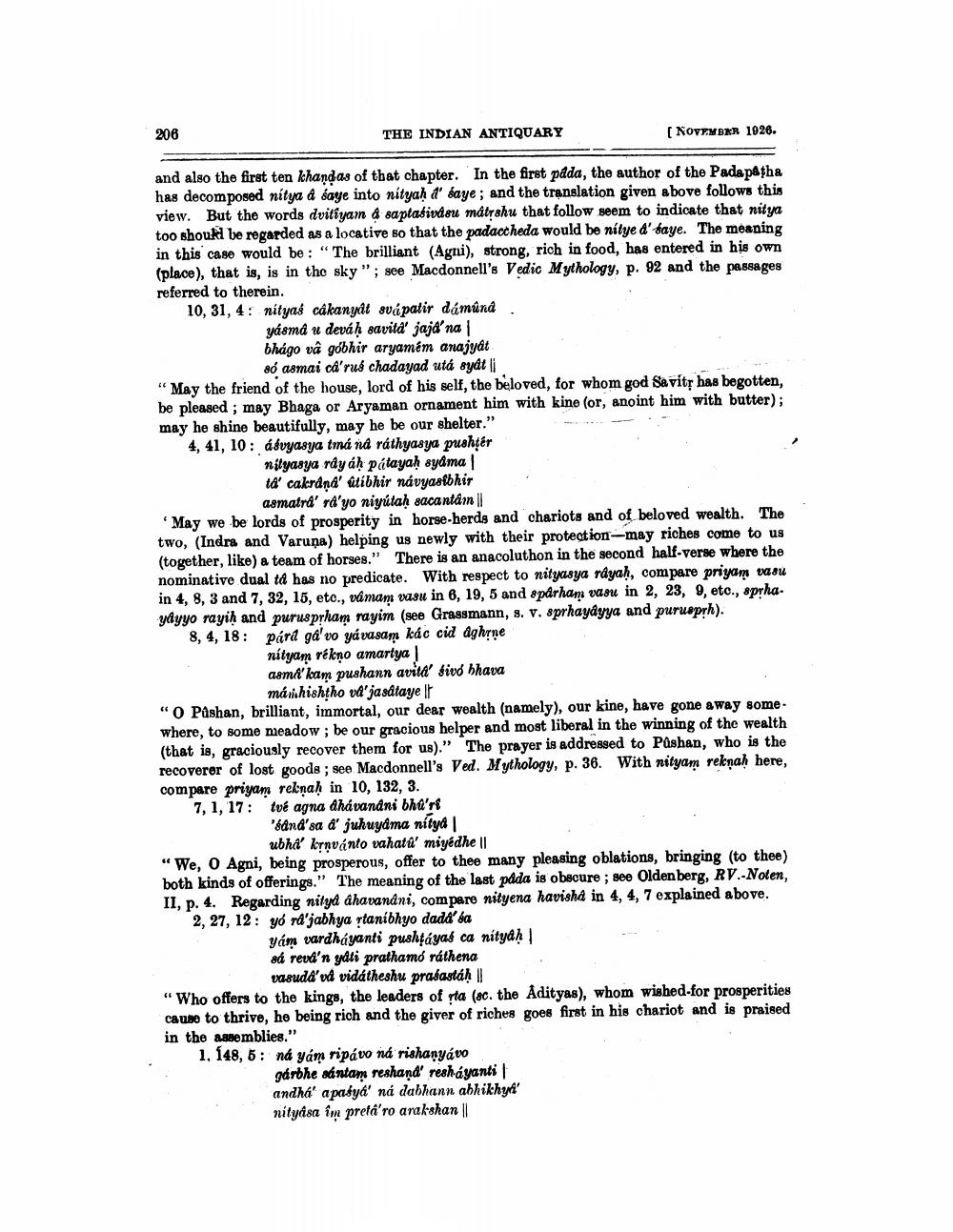________________
206
THE INDIAN ANTIQUARY
NOVEMBER 1926.
and also the first ten khandas of that chapter. In the first pdda, the author of the Padapatha has decomposed nitya d saye into nityah d' saye; and the translation given above follows this view. But the words dvitiyam & saptasivd su mátrohu that follow seem to indicate that nitya too shoukl be regarded as a locative so that the padaccheda would be nitye d'baye. The meaning in this case would be: "The brilliant (Agru), strong, rich in food, has entered in his own (place), that is, is in the sky"; see Macdonnell's Vedic Mythology, p. 92 and the passages referred to therein. 10, 31, 4: nityas câkanyât svápatir dámûnd.
yásmd u deváh savita' jajd' na 1 bhago va gobhir aryamém anajyát
80 asmai ca'ruz chadayad utá syat i "May the friend of the house, lord of his self, the beloved, for whom god Savitr has begotten, be pleased ; may Bhaga or Aryaman ornament him with kine (or, anoint him with butter); may he shine beautifully, may he be our shelter." 4, 41, 10: átvyasya tmá na ráthyasya pushter
nityasya rdy áh pátayah syama td' cakrand' útibhir návyasfbhir
asmatra' ra'yo niyútaḥ sacantam || May we be lords of prosperity in horse-berds and chariots and of beloved wealth. The two, (Indra and Varuna) helping us newly with their protection-may riches come to us (together, like) a team of horses." There is an anacoluthon in the second half-verse where the nominative dual tà has no predicate. With respect to nityasya rayaḥ, compare priyam vasu in 4, 8, 3 and 7, 32, 15, etc., vámam wasu in 6, 19, 5 and spárham vasu in 2, 23, 9, etc., sprhaydyyo rayih and purus pyham rayim (see Grassmann, s. v. sprhayayya and purusprh). 8, 4, 18: párd ga'vo yávasam kác cid aghrne
nityam rékno amartya asmi' kam pushann avita' sivo bhava
márishishtho vd' jasdtaye "O Pashan, brilliant, immortal, our dear wealth (namely), our kine, have gone away some where, to some meadow ; be our gracious helper and most liberal in the winning of the wealth (that is, graciously recover them for us)." The prayer is addressed to Pashan, who is the recoverer of lost goods ; see Macdonnell's Ved. Mythology, p. 36. With nityam reknah here, compare priyam reknah in 10, 132, 3. 7, 1, 17: tvé agna ahávandni bha'ri
'band'sa a' juhuyama nitya
ubhå' krnvánto vahatu' miyedhe il “We, O Agni, being prosperous, offer to thee many pleasing oblations, bringing (to thee) both kinds of offerings." The meaning of the last pada is obscure ; see Oldenberg, RV.-Noten, II, p. 4. Regarding nitya dhavanâni, compare nityena havisha in 4, 4, 7 explained above. 2, 27, 12: yo ra'jabhya ytanibhyo dada ba
yám vardhayanti pushțáyas ca nityah sá revá'n yati prathamó ráthena
vasudvd vidátheshu prasastáh | “Who offers to the kings, the leaders of rta (sc. the Adityas), whom wished for prosperities cause to thrive, he being rich and the giver of riches goes first in his chariot and is praised in the assemblies." 1. 148, 5: ná yám ripávo na rishanyávo
gárbhe sántam reshand' reshayanti andha' a patyá' ná dabhann abhikhyi' nitydsa im pretá' ro arakshan ||




